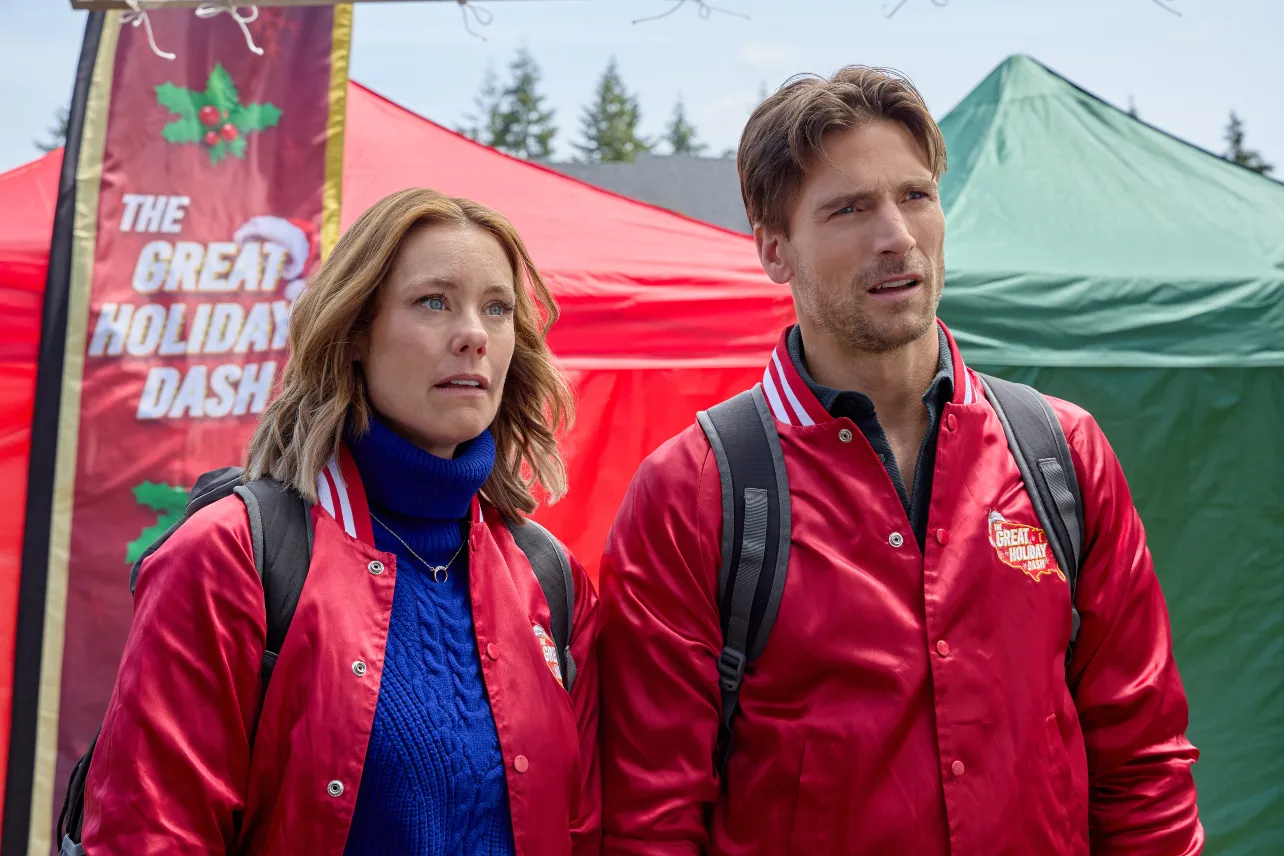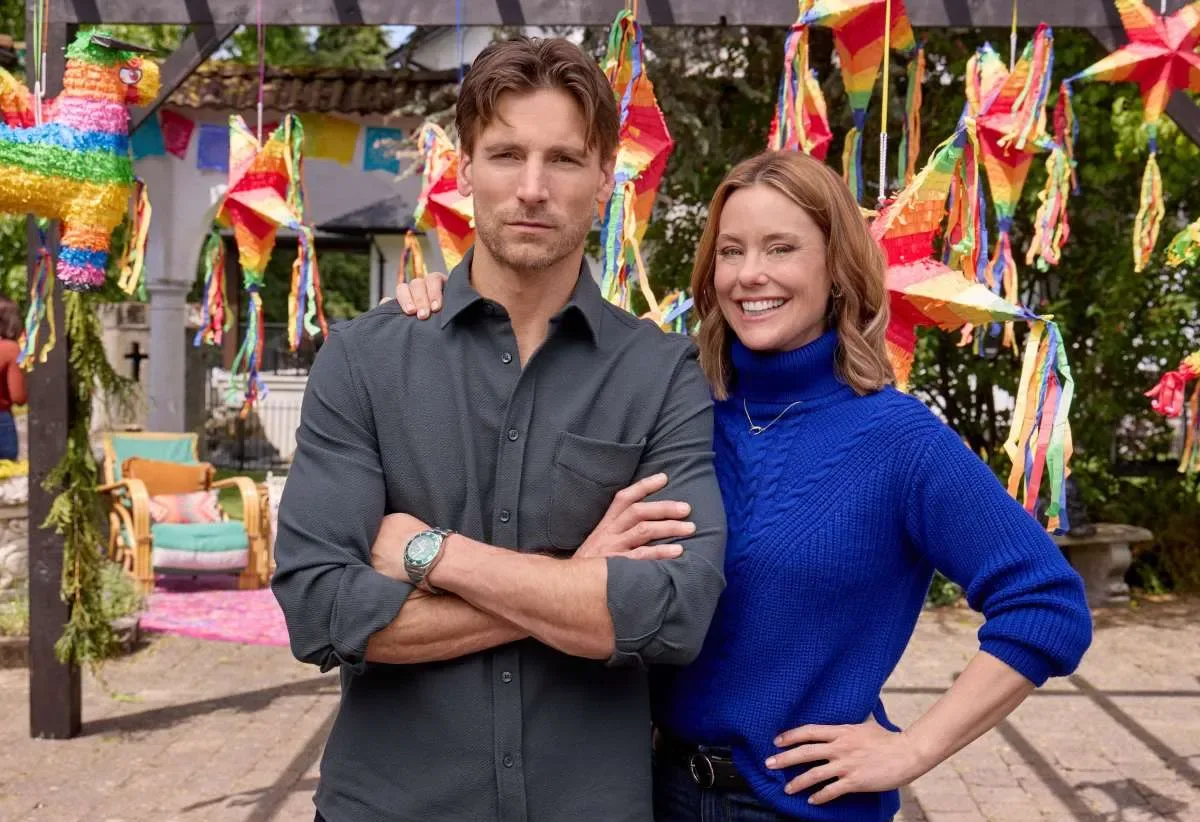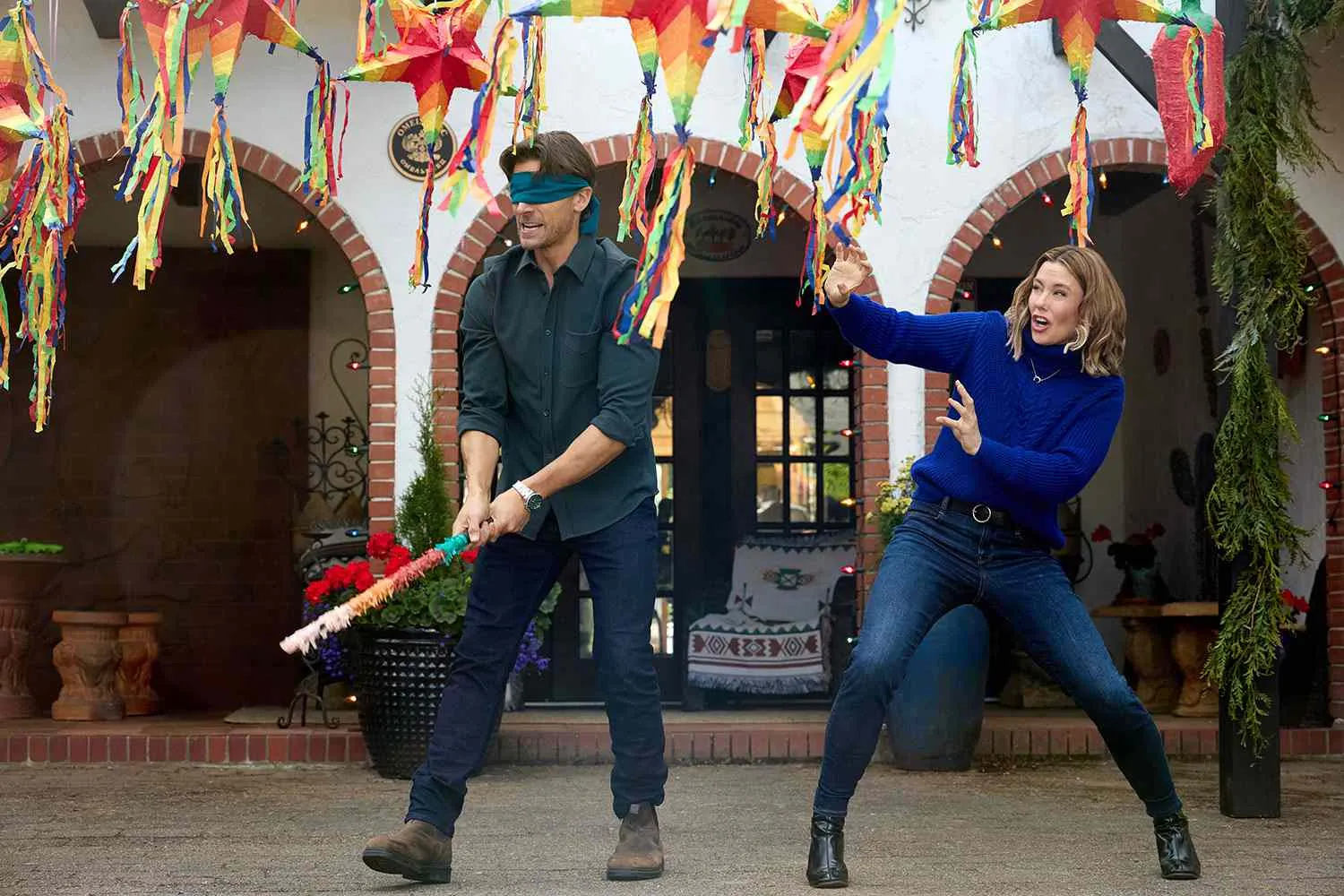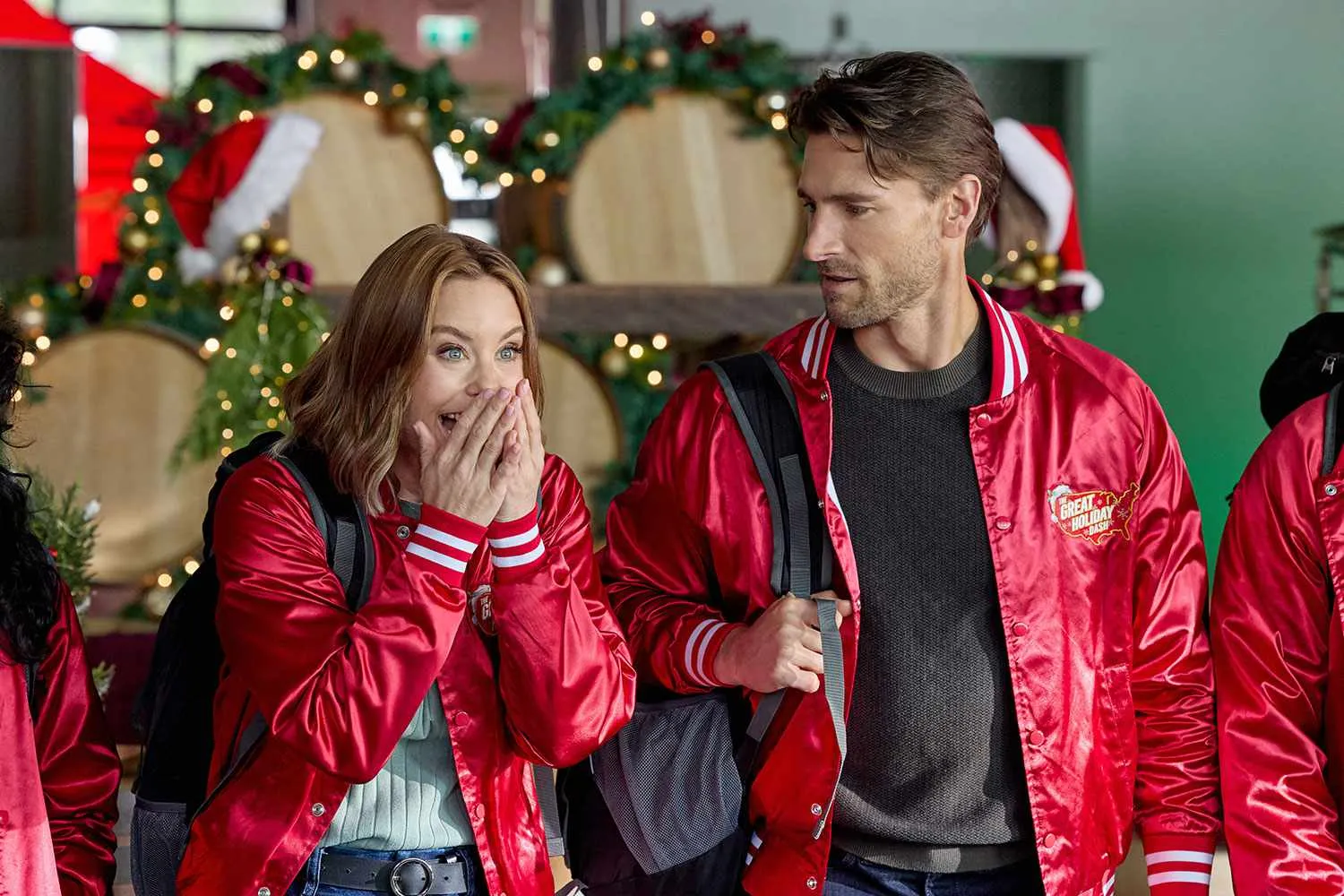Jingle Bell Run is a new Hallmark Christmas movie that changes the usual recipe for holiday movies by combining reality competition and romantic comedy in a fun way. In a movie set against a national Christmas-themed reality show, Avery Muller, an elementary school teacher, and Wes, a retired NHL player, deal with tough competition and an unexpected romantic connection.
Using a clever mix of action-packed shows like “The Amazing Race” and cozy Hallmark holiday movies, the movie makes you feel good all over. Imagine going on a cross-country trip where finding a hidden silver bell, solving puzzles, and finishing challenges are the ways to find love. It’s not just another Christmas movie; it’s a holiday adventure that keeps people wondering and cheering for the couple with nothing in common.
As part of Hallmark’s popular “Countdown to Christmas” series, “Jingle Bell Run” tells a new holiday story. The movie appeals to people who want more than typical love stories by adding a competitive factor that makes it feel like a live game show. In the end, they made a fun, interesting movie that has the spontaneity of reality TV and the sweet feel of holiday movies.
Ashley Williams and Andrew Walker play the lead parts in the movie. Both have been in many Hallmark movies before, and they bring realism and chemistry to their roles, which makes the competition and romance feel real.
Racing Hearts: A Christmas Competition of Love
Avery Muller is an elementary school teacher in Chicago. Her life is all about her children and her quiet routines. Her sister secretly puts her in “The Great Holiday Dash,” a nationwide reality show with a Christmas theme like “The Amazing Race” but with holiday magic added in. Avery doesn’t want to be paired with Wes at first and is totally out of her comfort zone, but he is a retired NHL player who wants to stay in the public eye.
Their relationship gets off to a rough start when Avery’s lack of athleticism throws them both off treadmills during their first workout. Wes has a hard time hiding his anger at first. As they move through the race, though, something strange happens. Avery is the strategic genius who can solve hard puzzles, while Wes gives them the strength they need to finish tough jobs.
The game turns into a journey of finding out more about yourself. Wes faces his worries about what will happen to his job after sports, and Avery learns to enjoy being spontaneous and trying new things. As they go through eight difficult legs of a race that tries their mental and physical strength, their relationship changes from reluctant teammates to real partners.
When a director tells Wes to create a romantic plot to attract more viewers, things take a dramatic turn. When Avery finds out about this possible trick, she feels cheated. But Wes proves his true feelings by telling her he’s fallen in love with her in a way that goes beyond any producer’s plot.
In a touching ending, they win the race and give their prize money to the other competitors to show how close they have become. Love and connection can happen strangely, even during a high-stakes Christmas race.
Dashing Through Love: Character Dynamics and Performances
Ashley Williams gives Avery Muller a lot of warmth and depth in her acting. As an elementary school teacher, she shows kindness and quiet drive. At first, she seems like someone who would feel more at ease in the classroom routine than on a high-stakes reality show. From not wanting to compete to become a confident rival who finds her adventurous spirit, her character arc changes beautifully.
Andrew Walker gives Wes an intriguing mix of toughness and vulnerability in his performance. As a former NHL player who wants to stay relevant, he first sees the tournament as a way to bring his career back to life. On the other hand, Walker does a great job of showing Wes’s deeper sides, showing a man struggling with who he is after sports and finding meaning outside of sports.
Their chemistry on-screen makes the movie more complex than just a typical holiday romance. They treat each other respectfully in their relationship, which goes against typical rom-com tropes by avoiding pointless conflict and building a real partnership.
The secondary cast gives the story a lot of interesting depth. David Lewis shines as the show’s host, Keegan, catches the real-life charm of a game show host. Heartwarming relationships between other competing couples, like Shirley and Katie and Ramon and Brad, show that the race is about more than just winning.
The cast makes you feel like you’re all in it together, which fits the movie’s main message about friendship, teamwork, and how relationships can grow in strange ways. Each character, even if only shown briefly, adds to the movie’s Christmas spirit and sense of community happiness.
Unwrapping Love: More Than Just a Holiday Race
“Jingle Bell Run” changes the typical holiday romance by adding complicated themes of personal growth, unexpected connections, and real human compassion to its racing plot. The movie is about how two people who don’t seem to be a good match can find deep understanding and love by working together and respecting each other.
Avery and Wes’s friendship goes beyond what you’d expect from a typical romantic comedy. Their relationship grows naturally as they face the same problems, help each other, and are openly vulnerable. Wes’s problems finding meaning in his life after sports fit perfectly with Avery’s careful, organized life, making for a story about getting out of your comfort zone and taking advantage of unexpected chances.
A strong message of teamwork comes through. Even though they didn’t get along at first, Avery and Wes show how working skills together can turn a potential conflict into a strong relationship. When they work together, they are stronger than the sum of their parts. She is smart and can solve problems, and he is strong.
The game itself stands for growing as a person. With every task, you find new levels of courage and adaptability that you didn’t know you had. Their journey shows a bigger lesson about finding your hidden talents and how important it is to believe in yourself, similar to Avery’s classroom mantra, “We can do hard things.”
Small acts of kindness, not big actions, bring out the holiday spirit. Sharing their winnings with other participants is a great example of what Christmas is all about: community, kindness, and connecting with others. The movie makes the point that winning isn’t about how well you do on your own but how well you help each other along the way.
Ultimately, “Jingle Bell Run” shows that love, like any great journey, needs people to be open, trusting, and ready to run toward something new.
Mapping Love: Navigating Christmas Challenges
“Jingle Bell Run” changes the usual holiday movie plot into a fast-paced, cross-country journey that cleverly works around production problems by telling a creative story. The premise suggests a race across the country. Still, the movie uses stock footage and carefully planned sets to make it seem like the characters have traveled a lot.
Each leg of “The Great Holiday Dash” is like a mini-story. It has Christmas trivia questions specific to each place and challenges with a local theme that keep the competition moving quickly. Even though viewers won’t see real city tours, the production design ensures each place feels unique and fun. Stock footage gives the video background, and carefully built sets catch the feel of each place.
The eight legs of the competition are more than just moving from one place to another; they’re also story-building blocks that slowly show Avery and Wes’s relationship. Christmas-specific problems add holiday magic to every moment, turning possible production problems into chances to tell a story.
The film’s cinematography balances the fast-paced energy of a reality show and the warm, personal moments of a holiday romance. The carefully planned scenes and bright, saturated colors make me think of game shows but with the cozy look that people expect from Hallmark movies.
The Christmas decorations, twinkling lights, and festive scenery make the production design feel like a character in and of itself. Each set looks and feels like a fancy holiday scene, turning what could be boring competition areas into magical places where love and excitement meet.
This creates an interesting visual experience that makes viewers forget they’re looking at carefully put-together sets. Instead, they feel like they’re on a Christmas trip across the country to connect and discover.
Dashing Through Genres: Navigating Love and Competition
“Jingle Bell Run” expertly balances the dynamics of reality TV and the rules of romantic comedies, creating a new kind of watching experience that is both familiar and refreshingly different. The movie changes the typical holiday romance by adding a competition element that moves the story along very quickly.
The clever structure is set up to look like a live reality show, complete with confessional-style moments and more difficult challenges that serve two purposes: moving the competition forward and strengthening Avery and Wes’s friendship. Each problem turns into a literal and figurative test of how close they are getting, turning problems that might seem normal into chances to grow as people and build love tension.
The movie’s secret tool is its pace. The story never loses its flow by mixing exciting competition scenes with personal moments between characters. The eight parts of “The Great Holiday Dash” are like chapters in a story. Each adds new elements while keeping the same lively energy that keeps people watching.
The changes between tasks are smooth, and there isn’t any of the awkward exposition that you usually see in made-for-TV movies. The competitive style makes it easy to tell a story because characters can show who they are through actions instead of long conversations. Wes’s background in sports and Avery’s ability to solve problems aren’t just plot elements; they help build characters.
The story’s arc follows a satisfyingly expected but still interesting path. Even though viewers know where the story is going, they are still fascinated by the unexpected emotional turns that happen along the way. Romantic comedy tropes are subtly turned on their heads, giving the story a sense of surprise within a familiar structure.
“Jingle Bell Run” goes beyond a simple holiday romance by using the race as more than just a background. It becomes an exciting look at friendship, teamwork, and love that comes out of the blue.
Sparks and Quips: Moments That Make Magic
For Avery and Wes, the gym scene is the perfect first date because it shows how they interact with each other in a funny, awkward way. Imagine two people who are different from each other falling off treadmills. This is both a metaphor and a literal representation of their first meeting. The kind of meet-cute that lets you know right away that they will hit it off, setting the stage for everything that will happen.
Some of the most memorable conversations come from people being vulnerable in ways they didn’t expect. In class, Avery’s “We can do hard things” pep talk becomes a repeating theme. It goes from being a message to one of her students to a personal mantra that stays with them throughout the competition. What a touching moment when her young student repeats this to her before the competition! It captures the movie’s spirit, which is one of support and personal growth.
Wes’s efforts at humor often show how insecure he is. His jokes about winning turn into a defense strategy that slowly gives way to a real connection. One memorable line hints at his battle with how to be relevant after sports. This moment gives an otherwise one-dimensional character an unexpected depth.
When Avery discovers that the director is trying to fake their relationship, she reaches her emotional peak. This scene successfully goes against how reality shows usually work, letting Wes show that his feelings are real. In that moment, the battle goes from just a game to a real journey of connection.
One of the most touching scenes is sharing their winnings, showing that their bond goes beyond the fight. These subtle moments make “Jingle Bell Run” more than a typical holiday romance. They make it a real look at how people connect.
The dialogue is full of life and energy, going from funny enough to make you laugh out loud to touching times of vulnerability. Each line is carefully chosen to shed light on a character, move the story forward, and keep readers enthralled.
The Review
Jingle Bell Run
In a world of holiday romances, "Jingle Bell Run" is a delightful treat. The movie goes beyond what you'd expect from a normal Hallmark movie by cleverly combining elements of reality competition with real emotional depth. Ashley Williams and Andrew Walker give performances that are both real and charming, turning what could have been a boring idea into a story that is interesting to read. The movie's strength is that it can switch between intense competition scenes and real character growth moments. It does a good job of breaking down reality show tropes while recognizing the strange ways people can connect. The Christmas setting isn't just for looks; it's an important part of the story's warmth and joy. The movie has a predictable romantic comedy plot. Still, it does it with such genuine enthusiasm and smart writing that viewers will be fully invested. The movie is more than typical holiday fare thanks to its great cast, clever conversation, and creative challenges.
PROS
- Exceptional chemistry between lead actors
- Innovative narrative combining reality TV and romance
- Witty, engaging dialogue
- Fresh take on holiday movie genre
- Strong character development
- Balanced humor and emotional depth
CONS
- Predictable romantic comedy structure
- Some reliance on typical Hallmark movie tropes
- Potentially unrealistic competition scenarios
- Limited character backstory exploration





















































